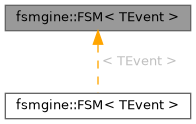Loading...
Searching...
No Matches
fsmgine::FSM< TEvent > Class Template Reference
A high-performance finite state machine implementation. More...
#include <FSM.hpp>
Inheritance diagram for fsmgine::FSM< TEvent >:

Public Types | |
| using | Predicate = std::function< bool(const TEvent &)> |
| Type alias for transition predicates. | |
| using | Action = std::function< void(const TEvent &)> |
| Type alias for transition actions. | |
Public Member Functions | |
| FSM ()=default | |
| Default constructor. | |
| FSM (const FSM &)=delete | |
| FSM & | operator= (const FSM &)=delete |
| FSM (FSM &&other) noexcept | |
| Move constructor. | |
| FSM & | operator= (FSM &&other) noexcept |
| Move assignment operator. | |
| FSMBuilder< TEvent > | get_builder () |
| Creates a builder for fluent FSM construction. | |
| void | setInitialState (std::string_view state) |
| Sets the initial state of the FSM. | |
| void | setCurrentState (std::string_view state) |
| Changes the current state of the FSM. | |
| std::string_view | getCurrentState () const |
| Gets the name of the current state. | |
| bool | process (const TEvent &event) |
| Processes an event and potentially transitions to a new state. | |
| bool | process () |
| Processes a transition for event-less FSMs. | |
Friends | |
| class | FSMBuilder< TEvent > |
| class | TransitionBuilder< TEvent > |
Detailed Description
template<typename TEvent = std::monostate>
class fsmgine::FSM< TEvent >
class fsmgine::FSM< TEvent >
A high-performance finite state machine implementation.
- Template Parameters
-
TEvent The event type used for transitions (defaults to std::monostate for event-less FSMs)
The FSM class provides a flexible and efficient state machine implementation with the following features:
- Type-safe state and event handling
- Support for guards (predicates) and actions on transitions
- On-enter and on-exit actions for states
- String interning for optimized state name storage
- Thread-safety when using the FSMgineMT library variant
- Thread Safety
- The thread-safety of FSM operations depends on which library variant you're using:
- FSMgine: No thread synchronization, optimal for single-threaded applications
- FSMgineMT: Full thread-safety with mutex protection on all operations
- Example
- // Define an event typestruct Event { std::string type; };// Create an FSMFSM<Event> machine;machine.get_builder().from("Idle").to("Working").when([](const Event& e) { return e.type == "start"; }).from("Working").to("Idle").when([](const Event& e) { return e.type == "stop"; }).build("Idle");// Process eventsbool process(const TEvent &event)Processes an event and potentially transitions to a new state.Definition FSM.hpp:294FSMBuilder< TEvent > get_builder()Creates a builder for fluent FSM construction.Definition FSM.hpp:227
Member Typedef Documentation
◆ Action
template<typename TEvent = std::monostate>
| using fsmgine::FSM< TEvent >::Action = std::function<void(const TEvent&)> |
Type alias for transition actions.
Functions executed during transitions or state changes
◆ Predicate
template<typename TEvent = std::monostate>
| using fsmgine::FSM< TEvent >::Predicate = std::function<bool(const TEvent&)> |
Type alias for transition predicates.
Functions that evaluate whether a transition should occur based on an event
Constructor & Destructor Documentation
◆ FSM()
template<typename TEvent = std::monostate>
|
inlinenoexcept |
Move constructor.
- Parameters
-
other FSM to move from
Member Function Documentation
◆ get_builder()
template<typename TEvent >
| FSMBuilder< TEvent > fsmgine::FSM< TEvent >::get_builder | ( | ) |
Creates a builder for fluent FSM construction.
- Returns
- A new FSMBuilder instance for this FSM
- Example
◆ getCurrentState()
template<typename TEvent >
| std::string_view fsmgine::FSM< TEvent >::getCurrentState | ( | ) | const |
Gets the name of the current state.
- Returns
- The current state name
- Exceptions
-
FSMNotInitializedError if no initial state has been set
◆ operator=()
template<typename TEvent = std::monostate>
|
inlinenoexcept |
◆ process() [1/2]
template<typename TEvent = std::monostate>
|
inline |
Processes a transition for event-less FSMs.
- Returns
- true if a transition occurred, false otherwise
- Note
- This method is only available for FSM<> or FSM<std::monostate>
◆ process() [2/2]
template<typename TEvent >
| bool fsmgine::FSM< TEvent >::process | ( | const TEvent & | event | ) |
Processes an event and potentially transitions to a new state.
- Parameters
-
event The event to process
- Returns
- true if a transition occurred, false otherwise
- Exceptions
-
FSMNotInitializedError if no initial state has been set FSMStateNotFoundError if the current state is invalid FSMInvalidStateError if a transition has no target state
◆ setCurrentState()
template<typename TEvent >
| void fsmgine::FSM< TEvent >::setCurrentState | ( | std::string_view | state | ) |
Changes the current state of the FSM.
- Parameters
-
state The name of the state to transition to
- Exceptions
-
FSMInvalidStateError if the state doesn't exist
- Note
- This executes on-exit actions for the current state and on-enter actions for the new state
◆ setInitialState()
template<typename TEvent >
| void fsmgine::FSM< TEvent >::setInitialState | ( | std::string_view | state | ) |
Sets the initial state of the FSM.
- Parameters
-
state The name of the initial state
- Exceptions
-
FSMInvalidStateError if the state doesn't exist
- Note
- This also executes any on-enter actions for the initial state
The documentation for this class was generated from the following file:
- include/FSMgine/FSM.hpp